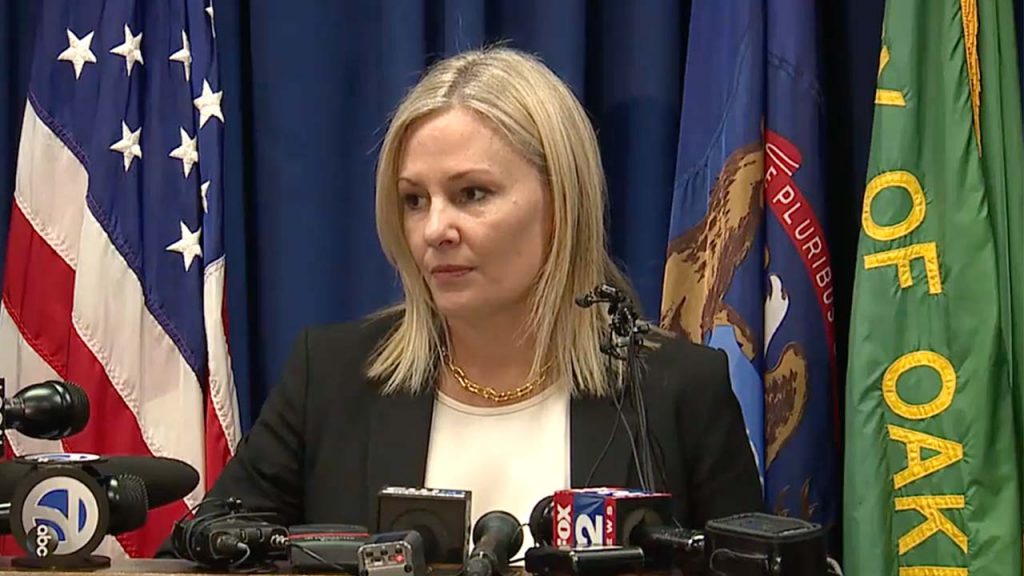Crumbley hearing is unusually complex, could pave way for criminalizing parenting decisions, experts say
Prosecutors took the rare step of charging James and Jennifer Crumbley, the parents of the Oxford High School student accused of killing four classmates last year, with involuntary manslaughter.

A preliminary hearing resumed Thursday for the parents of the alleged shooter who killed four classmates at Oxford High School last November.
Prosecutors took the rare step of charging James and Jennifer Crumbley, the parents of the Oxford High School student accused of killing four classmates last year, with involuntary manslaughter.
And legal experts say the hearing is unusually complex and the outcome could pave the way for criminalizing parenting decisions.
James and Jennifer Crumbley’s preliminary exam continued Thursday after it was paused two weeks ago. The preliminary exam is a chance for the prosecution to present evidence and witnesses.
That includes Jennifer Crumbley’s work supervisor, Andrew Smith, who testified on Feb. 8. He recited text messages she’d sent him the day prosecutors allege her son took a gun to school and went on a murderous rampage.
“Where do we draw the line for criminal liability, not just for parents but for all the other responsible parties who had a role to play in this case? With respect to the school with respect to the gun store that sold them the gun? These are all entities that could in theory be criminally liable.” —Kate Weisburd, George Washington University
Oakland County Prosecutor Karen McDonald questioned Smith over a text conversation he had with Jennifer, the company’s marketing director, on the day of the shooting.
“And what does it say?” McDonald asked.
“OMG Andy he’s going to kill himself, he must be the shooter,” Smith said.
“And then the next text?”
“I need a lawyer, at substation with police.”
“And then what else?”
“Ethan did it.”
Prosecutors claim the Crumbleys knew that their son was troubled but they bought him a hand gun for Christmas anyway.
They say school officials called them in and showed them pictures he’d drawn depicting blood and violence but they refused to take him out of class and back home.
McDonald argues that the parents had a duty to protect the community from their son.
“The defendants owed a duty to the community to prevent their son, who they had every reason to believe and saw was a danger. They knew he was preoccupied with violent material, that he had access to a gun, he could use it when he wanted to and he was disturbed. It’s a parental duty … it goes far beyond carelessness … it’s gross negligence.”
Defense attorneys dispute whether the 15-year-old sophomore had easy access to a gun.
For the case to move on to a jury trial, the prosecution need only show it’s more likely than not the defendants committed a crime.
That often happens fairly quickly, but this case is different. And the hearing could still stretch on for days.
“It is unusual. But this is an unusual case with unusual facts and unusual theories.” — Bill Swor, immediate past president of the American Board of Criminal Lawyers
“It is unusual. But this is an unusual case with unusual facts and unusual theories,” says Bill Swor, who has practiced law in Michigan for decades and is the immediate past president of the American Board of Criminal Lawyers.
He says the prosecution may have solid grounds for civil action and indeed there have been civil lawsuits filed against the parents and school officials.
But Swor questions whether the evidence against the parents rises to the level of charging them with involuntary manslaughter.
“Being a bad parent is not a criminal act. For example, the statement they knew he was troubled, that doesn’t mean that they knew he intended to harm someone,” Swor says.
There are plenty of examples of prosecutors charging relatives when a child gains access to a gun and accidentally kills themselves or someone else.
Kate Weisburd teaches law at George Washington University and says the prosecution’s assertion that the Crumbleys knew their son could become violent makes this case unique.
“Where do we draw the line for criminal liability, not just for parents but for all the other responsible parties who had a role to play in this case? With respect to the school with respect to the gun store that sold them the gun? These are all entities that could in theory be criminally liable,” Weisburd says.
Legal experts say the decision made by the judge in this preliminary hearing and by a jury if it does go to trial could have larger implications and possibly reset the boundaries of the law.
Trusted, accurate, up-to-date.
WDET strives to make our journalism accessible to everyone. As a public media institution, we maintain our journalistic integrity through independent support from readers like you. If you value WDET as your source of news, music and conversation, please make a gift today.
